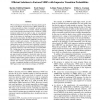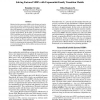178 search results - page 14 / 36 » Efficient Approximation of Optimal Control for Markov Games |
100
click to vote
AIPS
2009
15 years 27 days ago
2009
When modeling real-world decision-theoretic planning problems in the Markov decision process (MDP) framework, it is often impossible to obtain a completely accurate estimate of tr...
107
click to vote
IJCAI
2001
15 years 1 months ago
2001
R-max is a very simple model-based reinforcement learning algorithm which can attain near-optimal average reward in polynomial time. In R-max, the agent always maintains a complet...
120
click to vote
AIPS
2006
15 years 1 months ago
2006
Markov decision processes (MDPs) with discrete and continuous state and action components can be solved efficiently by hybrid approximate linear programming (HALP). The main idea ...
CDC
2009
IEEE
15 years 4 months ago
2009
IEEE
Abstract— Q-learning is a technique used to compute an optimal policy for a controlled Markov chain based on observations of the system controlled using a non-optimal policy. It ...
102
click to vote
CDC
2010
IEEE
14 years 6 months ago
2010
IEEE
The Markov chain approximation method is an effective and widely used approach for computing optimal values and controls for stochastic systems. It was extended to nonlinear (and p...


